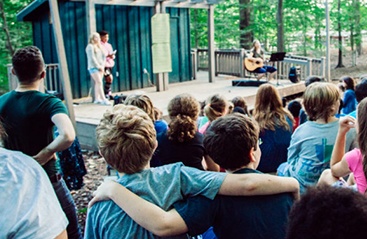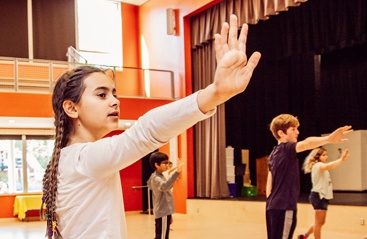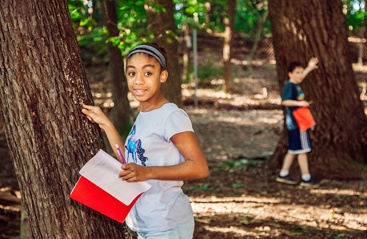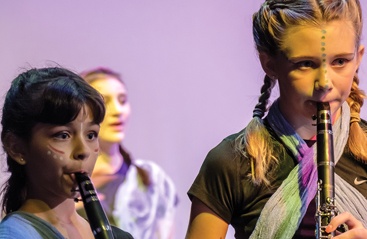Burgundy Trans/Nonbinary Policy
It is important that all of our students are welcomed and encouraged to engage as their full selves in all aspects of the Burgundy community. We have been reminded of how important it is to be visible in our support of all aspects of every person’s identity. Therefore a group of faculty and staff began work on a policy to support our goal of ensuring full inclusion and engagement for transgender and gender nonconforming students. The following Trans/Nonbinary Policy is the result of that effort:
At Burgundy, we believe that children learn best in an inclusive, creative, and nurturing environment that engages the whole child, cultivates independent thinking, promotes academic excellence, and instills respect for diversity. In keeping with our Burgundy mission, this document seeks to provide an inclusive policy pertaining to transgender and gender nonconforming students, using language aligned with our school mission, educational philosophy, student/employee handbooks, and applicable Virginia and federal laws.
This Burgundy Policy on Transgender and Gender Nonconforming Students outlines progressive and inclusive practices to ensure that all students, regardless of their gender identity or expression, are safe, seen, affirmed, and respected at Burgundy. The policy is derived directly from GLSEN, a non-profit entity created by educators that advise and advocate for comprehensive policies designed to protect LGBTQ+ students as well as students of marginalized identities. GLSEN’s model was developed by examining school district policies from various states, drawing from best LGBTQ+ practices provided by state and federal government protections.
PURPOSE OF THIS POLICY
- (1) to foster an educational environment that is safe, welcoming, and free from stigma and discrimination for all students, regardless of gender identity or expression,
- (2) to facilitate processes and procedures that affirm and protect the rights of transgender and gender-expansive students (in adherence to our school mission, consequent policies, procedures, applicable laws concerning bullying, harassment, privacy, and discrimination) and,
- (3) to ensure that all students have the opportunity to express themselves and live authentically.
RESOURCES
GLSEN is the leading national education organization focused on ensuring safe and affirming schools for all students. Established in 1990, GLSEN envisions a world in which every child learns to respect and accept all people, regardless of sexual orientation or gender identity/expression. GLSEN seeks to develop school climates where difference is valued for the positive contribution it makes to creating a more vibrant and diverse community.
The National Center for Transgender Equality (NCTE) is a national social justice organization devoted to ending discrimination and violence against transgender people through education and advocacy on national issues of importance to transgender people. By empowering transgender people and our allies to educate and influence policymakers and others, NCTE facilitates a strong and clear voice for transgender equality in our nation’s capital and around the country.
A NOTE ON TERMINOLOGY
Our words have the power to prevent or ease suffering for LGBTQ+ students. School staff and educators should use terms that students use to describe themselves and avoid terms that make these students uncomfortable. Transgender and gender nonconforming children may use different words to describe their lived experiences of gender. Terminology and language can differ based on region, language, race or ethnicity, age, culture, and many other factors. Some examples of terms used include trans, non-binary, genderqueer, gender fluid, and Two Spirit. These terms often mean different things or refer to different experiences of gender.
DEFINITIONS
These definitions are provided to assist in understanding this policy in tandem with our legal obligations. Students may or may not use these terms to describe themselves or their experiences and should not feel unwillingly labeled by these terms by any Burgundy student, teacher, staff, administrator, community member, and/or entity.
GENDER EXPRESSION: The manner in which a person represents or expresses gender to others, often through behavior, clothing, hairstyles, activities, voice, or mannerisms.
GENDER IDENTITY: A person’s deeply held knowledge of their own gender, which can include being female, male, another gender, or no gender. Gender identity is an innate and largely inflexible part of a person’s identity. One’s gender identity can be the same or different than the gender assigned at birth. The responsibility for determining an individual’s gender identity rests with the individual. Children typically begin to understand their own gender identity by age four, although the age at which individuals come to understand and express their gender identity may vary based on each person’s social and familial development.
GENDER NONCONFORMING: A term sometimes used to describe people whose gender expression differs from stereotypical expectations, such as “feminine” boys, “masculine” girls, and people who are perceived as androgynous in some way. Most gender nonconforming people are not transgender. For example, a non-transgender girl who has short hair and likes sports might be considered gender nonconforming. The term “gender nonconforming” is also sometimes used to refer to people whose gender identity is not male or female.
NONBINARY/GENDERQUEER: These are terms often used to describe people whose gender is not exclusively male or female, including those who identify with a gender other than male or female, as more than one gender, or as no gender.
SEXUAL ORIENTATION: A person’s romantic and/or physical attraction to people of the same and/or another gender, such as being straight, gay, bisexual, or asexual. Transgender and gender nonconforming people may have any sexual orientation.
TRANSGENDER: An adjective describing a person whose gender identity is different from that traditionally associated with the gender they were thought to be when they were born. A transgender girl is a girl who was thought to be male when she was born. A transgender boy is a boy who was thought to be female when he was born. Some transgender people have a gender that is neither male nor female and may use terms like non-binary to describe their gender.
TRANSITION: The process in which a person begins to live according to their gender identity, rather than the gender they were thought to be at birth. Transition is a process that is different for everyone, and it may or may not involve social, legal, or physical changes. There is no one step or set of steps that an individual must undergo in order to have their gender identity affirmed and respected.
BULLYING: Written, verbal, or physical conduct, including via electronic communication, that is sufficiently severe, persistent, or pervasive to limit a student’s ability to participate in, or benefit from, a school program or activity, or to create a hostile or abusive educational environment, adversely affecting a student’s education, including acts of verbal, nonverbal, or physical aggression or intimidation. This includes bullying that is based on a student’s actual or perceived race, color, national origin, sex, disability, sexual orientation, gender identity or expression, religion, or another distinguishing characteristic. This also includes conduct that targets a student because of a characteristic of a friend, family member or other person or group with whom a student associates. Bullying is frequently referred to as harassment when it pertains to a characteristic protected by non-discrimination laws.
DETERMINING GENDER IDENTITY
Gender identity is a core aspect of human personal identity. This policy is based on the principle that only an individual can determine their own gender identity. This approach is consistent with current best medical practices, progessive education ideology, and trends in state and federal law. Regardless of whether state laws explicitly address gender identity and expression, this self-identifying approach for transgender and nonconforming students is protected under Title IX and state sex discrimination laws and may also be protected under state laws regarding disability discrimination. Schools should avoid requiring medical, legal, or other “proof” in order to honor and respect a student’s gender identity.
SCOPE
This policy covers conduct that takes place during the school day (on school property), at school-sponsored functions, and activities during a student’s commute to and from school. This policy also pertains to usage of electronic communication that occurs during the school day (on school property), at school-sponsored functions, and on school computers, networks, forums, and mailing lists, as well as any electronic communication that is directed at a student and that interferes with the student’s ability to participate in or benefit from the services, activities, or privileges provided by the school. This policy applies to the entire Burgundy community, including educators, staff, students, guardians, and volunteers.
BULLYING, HARASSMENT, & DISCRIMINATION
Discrimination, bullying, and harassment on the basis of gender identity or expression is prohibited within the Burgundy student (and employee) handbook(s). It is the responsibility of all teachers, staff and administrators to ensure that all students (including transgender and gender nonconforming students) feel safe at school. The scope of this responsibility includes ensuring that any incident of discrimination, harassment, or bullying is given immediate attention, including reporting it to an appropriate supervisor, thoroughly investigating the incident, taking age- and developmentally appropriate action, disseminating this information amongst teachers, and providing students and staff with appropriate educational resources and support materials.
Complaints alleging discrimination or harassment based on a student’s gender identity and/or expression are to be taken seriously and handled in the same manner as other discrimination, bullying, or harassment complaints. Educational materials used as part of this process will be selected in collaboration with members of the Burgundy adult LGBTQ+ community. Queer, trans, and/or nonconforming members of the Burgundy community can provide important perspective and lived experience to administrators when an incident is being addressed. Administrators will offer the reporting student(s) an opportunity to choose an LGBTQ+ advocate to participate and consult with throughout the process.
NAMES, PRONOUNS & SCHOOL RECORDS
At Burgundy, every student has the right to be addressed by a name and pronouns that correspond to their self-identified gender. School personnel will discuss requested changes with students in a private setting. Burgundy plays an important role in providing a place of acceptance for transgender and gender nonconforming students. In many cases, school is the only safe space for a student to comfortably and fully express their gender. Therefore the school will always recognize and use the student’s expressed gender identity, including their chosen name and pronouns. Burgundy will provide appropriate and available additional services, such as counseling, peer support through a school GSA, and referral to outside resources that may help a student cope with family rejection. Whenever possible, Burgundy staff will facilitate family members’ understanding and acceptance of transgender and gender nonconforming students.
Counseling a family with a transgender and/or gender nonbinary student is a unique and personalized process; however, the following steps are generally taken:
- – Confer with the student first and then with family
- – Design a personalized timeframe to facilitate the process of institutional changes that are consistent with student wishes and needs
- – Continue a process of support for students and family members as needed.
- – Provide outside resources when necessary.
If a student has requested a different name at school, Burgundy will use the student’s chosen name and appropriate pronouns in all written and verbal correspondence. To ensure consistency among administrators, staff, and students, Burgundy will immediately update student education records (including attendance reports, emails, class rosters for substitutes, school IDs, transcripts, electronic records, etc.) with the student’s chosen name and appropriate gender markers in the areas the student has requested the change.
ACCESS TO GENDER-SEGREGATED ACTIVITIES & FACILITIES
At Burgundy, all students will have consistent access to restrooms, locker rooms, and changing facilities that correspond to their gender identity. All students, including transgender and nonbinary students, should determine which facilities are most consistent with their gender identity; students will not be required to use gender-segregated facilities that are inconsistent with their gender identity.
Burgundy has designated any existing facilities that are designed to be used by only one person at a time as accessible to all students regardless of gender. However, under no circumstances shall a student be required to use a single-user facility because they are transgender or gender nonconforming. Throughout campus upgrades and additions, Burgundy will consider incorporating additional single-user facilities and greater privacy into new construction and/or renovation plans and to assess ways to increase privacy for all students in existing facilities.
All students shall be permitted to participate in physical education classes and intramural sports in a manner consistent with their gender identity. Furthermore, all students shall be permitted to participate in interscholastic athletics in a manner consistent with their gender identity. As a general matter, Burgundy will evaluate all gender-based activities, rules, policies, and practices—including classroom activities, school ceremonies, and school photos—and maintain only those that serve an important educational purpose. Students shall be permitted to participate in any such activities or conform to any such rule, policy, or practice consistent with their gender identity.
PUBLICATION
This policy will be distributed annually to students, parents/guardians, and staff. It will also be included in any student codes of conduct, disciplinary policies, student handbooks, and school websites.
Inquire Now
Burgundy is a one-of-a-kind independent school for Junior Kindergarten through 8th Grade. We believe children learn best in an inclusive, creative, and nurturing environment that engages the whole child.
3700 Burgundy Road
Alexandria, VA 22303
703.960.3431
Accredited by:
Affiliated with: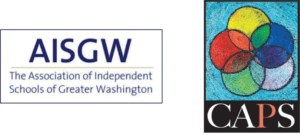
Partners with:
©2025 Burgundy Farm Country Day School
Designed and developed by The Design Channel![]()

